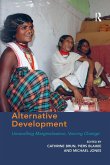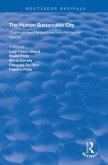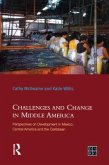Maxwell T BoykoffEnvironmental Knowledge, Meaning, Scale
Contentious Geographies
Environmental Knowledge, Meaning, Scale
Herausgeber: Goodman, Michael K
Maxwell T BoykoffEnvironmental Knowledge, Meaning, Scale
Contentious Geographies
Environmental Knowledge, Meaning, Scale
Herausgeber: Goodman, Michael K
- Broschiertes Buch
- Merkliste
- Auf die Merkliste
- Bewerten Bewerten
- Teilen
- Produkt teilen
- Produkterinnerung
- Produkterinnerung
The human-environment relationship is one of the most pressing concerns of the twenty-first century. Bringing together a range of global case studies to illustrate the broad range of current theories on this relationship, this book presents significant cutting-edge research into the continuing (re)definition of political ecology as it relates to environmental contestation.
Andere Kunden interessierten sich auch für
![Alternative Development Alternative Development]() Cathrine BrunAlternative Development65,99 €
Cathrine BrunAlternative Development65,99 €![The Human Sustainable City The Human Sustainable City]() Bruno ForteThe Human Sustainable City62,99 €
Bruno ForteThe Human Sustainable City62,99 €![Green Grabbing: A New Appropriation of Nature Green Grabbing: A New Appropriation of Nature]() James FairheadGreen Grabbing: A New Appropriation of Nature69,99 €
James FairheadGreen Grabbing: A New Appropriation of Nature69,99 €![Rural Livelihoods in China Rural Livelihoods in China]() Rural Livelihoods in China65,99 €
Rural Livelihoods in China65,99 €![Managing Environments for Leisure and Recreation Managing Environments for Leisure and Recreation]() Richard BroadhurstManaging Environments for Leisure and Recreation62,99 €
Richard BroadhurstManaging Environments for Leisure and Recreation62,99 €![Cultures of Glass Architecture Cultures of Glass Architecture]() Hisham ElkadiCultures of Glass Architecture65,99 €
Hisham ElkadiCultures of Glass Architecture65,99 €![Challenges and Change in Middle America Challenges and Change in Middle America]() Katie WillisChallenges and Change in Middle America79,99 €
Katie WillisChallenges and Change in Middle America79,99 €-
-
-
The human-environment relationship is one of the most pressing concerns of the twenty-first century. Bringing together a range of global case studies to illustrate the broad range of current theories on this relationship, this book presents significant cutting-edge research into the continuing (re)definition of political ecology as it relates to environmental contestation.
Produktdetails
- Produktdetails
- Verlag: Taylor & Francis Ltd (Sales)
- Seitenzahl: 264
- Erscheinungstermin: 31. Oktober 2016
- Englisch
- Abmessung: 234mm x 156mm x 14mm
- Gewicht: 376g
- ISBN-13: 9781138275591
- ISBN-10: 113827559X
- Artikelnr.: 72914530
- Herstellerkennzeichnung
- Libri GmbH
- Europaallee 1
- 36244 Bad Hersfeld
- gpsr@libri.de
- Verlag: Taylor & Francis Ltd (Sales)
- Seitenzahl: 264
- Erscheinungstermin: 31. Oktober 2016
- Englisch
- Abmessung: 234mm x 156mm x 14mm
- Gewicht: 376g
- ISBN-13: 9781138275591
- ISBN-10: 113827559X
- Artikelnr.: 72914530
- Herstellerkennzeichnung
- Libri GmbH
- Europaallee 1
- 36244 Bad Hersfeld
- gpsr@libri.de
Dr Michael K. Goodman is a Lecturer in Geography at King's College London, UK, Dr Maxwell T. Boykoff, is a Research Fellow at the Environmental Change Institute, University of Oxford, UK and Dr Kyle T. Evered, is an Assistant Professor of Geography at Michigan State University, USA.
Chapter 1 Contentious Geographies: Environmental Knowledge, Meaning, Scale,
Michael K. Goodman, Maxwell T. Boykoff, Kyle T. Evered; Part 1 Translating
Contentious Environmental Knowledge and Science; Chapter 2 The Contentious
World of Jared Diamond's Collapse, Tim Forsyth; Chapter 3 Fight Semantic
Drift!? Mass Media Coverage of Anthropogenic Climate Change, Maxwell T.
Boykoff; Chapter 4 Whose Scarcity? The Hydrosocial Cycle and the Changing
Waterscape of La Ligua River Basin, Chile, Jessica Budds; Part 2
Conflicting and Shifting Environmental Knowledges, Livelihoods, and Power;
Chapter 5 'Environmentality' in Rajasthan's Groundwater Sector: Divergent
Environmental Knowledges and Subjectivities, Trevor L. Birkenholtz; Chapter
6 Discursive Spearpoints: Contentious Interventions in Amazonian Indigenous
Environments, Logan A. Hennessy; Part 3 Environmental Movements: Contested
(Re)Scaling of Knowledges, Problems and Narratives; Chapter 7 Confronting
Invisibility: Reconstructing Scale in California's Pesticide Drift
Conflict, Jill Harrison; Chapter 8 Scale and Narrative in the Struggle for
Environment and Livelihood in Vieques, Puerto Rico, Karen Schmelzkopf;
Chapter 9 Making Local Places GE-Free in California's Contentious
Geographies of Genetic Pollution and Coexistence, Dustin Mulvaney; Part 4
Contested Production of Environmental Science, Law, and Knowledge; Chapter
10 Regional Power and the Power of the Region: Resisting Dam Removal in the
Pacific Northwest, Eve Vogel; Chapter 11 Law of Regions: Mining Legislation
and the Construction of East and West, Johanna Haas; Part 5 Fraught Spatial
Technologies and Knowledge Construction; Chapter 12 1An earlier and shorter
version of this chapter was published as an Introduction to Mapping
Communities: Ethics, Values, Practice (East-West Center, 2005) that
documents the collection of case studies covered by our project. Yet
another shorter communication was published as 'Mapping power: ironic
effects of spatial information technology', in Part Icipatory Learning and
Action 54: 98-105 (2006). This chapter is based upon work supported by the
National Science Foundation under Grant No. SDEST-0221912, the Rockefeller
Brothers Fund, and the Ford Foundation (through the Jakarta Office). We
would like to thank all the Part Icipants to the workshops for sharing
their ideas. Any opinions, findings and conclusions or recommendations
expressed in this material are those of the authors and do not necessarily
reflect the views of the National Science Foundation (NSF), the East-West
Center, or the University of Hawaii., Jefferson Fox, Krisnawati Suryanata,
Peter Hershock, Albertus Hadi Pramono; Chapter 13 Competing and Conflicting
Social Constructions of 'Land' in South Africa: The Case of and
Implications for Land Reform, Brent McCusker;
Michael K. Goodman, Maxwell T. Boykoff, Kyle T. Evered; Part 1 Translating
Contentious Environmental Knowledge and Science; Chapter 2 The Contentious
World of Jared Diamond's Collapse, Tim Forsyth; Chapter 3 Fight Semantic
Drift!? Mass Media Coverage of Anthropogenic Climate Change, Maxwell T.
Boykoff; Chapter 4 Whose Scarcity? The Hydrosocial Cycle and the Changing
Waterscape of La Ligua River Basin, Chile, Jessica Budds; Part 2
Conflicting and Shifting Environmental Knowledges, Livelihoods, and Power;
Chapter 5 'Environmentality' in Rajasthan's Groundwater Sector: Divergent
Environmental Knowledges and Subjectivities, Trevor L. Birkenholtz; Chapter
6 Discursive Spearpoints: Contentious Interventions in Amazonian Indigenous
Environments, Logan A. Hennessy; Part 3 Environmental Movements: Contested
(Re)Scaling of Knowledges, Problems and Narratives; Chapter 7 Confronting
Invisibility: Reconstructing Scale in California's Pesticide Drift
Conflict, Jill Harrison; Chapter 8 Scale and Narrative in the Struggle for
Environment and Livelihood in Vieques, Puerto Rico, Karen Schmelzkopf;
Chapter 9 Making Local Places GE-Free in California's Contentious
Geographies of Genetic Pollution and Coexistence, Dustin Mulvaney; Part 4
Contested Production of Environmental Science, Law, and Knowledge; Chapter
10 Regional Power and the Power of the Region: Resisting Dam Removal in the
Pacific Northwest, Eve Vogel; Chapter 11 Law of Regions: Mining Legislation
and the Construction of East and West, Johanna Haas; Part 5 Fraught Spatial
Technologies and Knowledge Construction; Chapter 12 1An earlier and shorter
version of this chapter was published as an Introduction to Mapping
Communities: Ethics, Values, Practice (East-West Center, 2005) that
documents the collection of case studies covered by our project. Yet
another shorter communication was published as 'Mapping power: ironic
effects of spatial information technology', in Part Icipatory Learning and
Action 54: 98-105 (2006). This chapter is based upon work supported by the
National Science Foundation under Grant No. SDEST-0221912, the Rockefeller
Brothers Fund, and the Ford Foundation (through the Jakarta Office). We
would like to thank all the Part Icipants to the workshops for sharing
their ideas. Any opinions, findings and conclusions or recommendations
expressed in this material are those of the authors and do not necessarily
reflect the views of the National Science Foundation (NSF), the East-West
Center, or the University of Hawaii., Jefferson Fox, Krisnawati Suryanata,
Peter Hershock, Albertus Hadi Pramono; Chapter 13 Competing and Conflicting
Social Constructions of 'Land' in South Africa: The Case of and
Implications for Land Reform, Brent McCusker;
Chapter 1 Contentious Geographies: Environmental Knowledge, Meaning, Scale,
Michael K. Goodman, Maxwell T. Boykoff, Kyle T. Evered; Part 1 Translating
Contentious Environmental Knowledge and Science; Chapter 2 The Contentious
World of Jared Diamond's Collapse, Tim Forsyth; Chapter 3 Fight Semantic
Drift!? Mass Media Coverage of Anthropogenic Climate Change, Maxwell T.
Boykoff; Chapter 4 Whose Scarcity? The Hydrosocial Cycle and the Changing
Waterscape of La Ligua River Basin, Chile, Jessica Budds; Part 2
Conflicting and Shifting Environmental Knowledges, Livelihoods, and Power;
Chapter 5 'Environmentality' in Rajasthan's Groundwater Sector: Divergent
Environmental Knowledges and Subjectivities, Trevor L. Birkenholtz; Chapter
6 Discursive Spearpoints: Contentious Interventions in Amazonian Indigenous
Environments, Logan A. Hennessy; Part 3 Environmental Movements: Contested
(Re)Scaling of Knowledges, Problems and Narratives; Chapter 7 Confronting
Invisibility: Reconstructing Scale in California's Pesticide Drift
Conflict, Jill Harrison; Chapter 8 Scale and Narrative in the Struggle for
Environment and Livelihood in Vieques, Puerto Rico, Karen Schmelzkopf;
Chapter 9 Making Local Places GE-Free in California's Contentious
Geographies of Genetic Pollution and Coexistence, Dustin Mulvaney; Part 4
Contested Production of Environmental Science, Law, and Knowledge; Chapter
10 Regional Power and the Power of the Region: Resisting Dam Removal in the
Pacific Northwest, Eve Vogel; Chapter 11 Law of Regions: Mining Legislation
and the Construction of East and West, Johanna Haas; Part 5 Fraught Spatial
Technologies and Knowledge Construction; Chapter 12 1An earlier and shorter
version of this chapter was published as an Introduction to Mapping
Communities: Ethics, Values, Practice (East-West Center, 2005) that
documents the collection of case studies covered by our project. Yet
another shorter communication was published as 'Mapping power: ironic
effects of spatial information technology', in Part Icipatory Learning and
Action 54: 98-105 (2006). This chapter is based upon work supported by the
National Science Foundation under Grant No. SDEST-0221912, the Rockefeller
Brothers Fund, and the Ford Foundation (through the Jakarta Office). We
would like to thank all the Part Icipants to the workshops for sharing
their ideas. Any opinions, findings and conclusions or recommendations
expressed in this material are those of the authors and do not necessarily
reflect the views of the National Science Foundation (NSF), the East-West
Center, or the University of Hawaii., Jefferson Fox, Krisnawati Suryanata,
Peter Hershock, Albertus Hadi Pramono; Chapter 13 Competing and Conflicting
Social Constructions of 'Land' in South Africa: The Case of and
Implications for Land Reform, Brent McCusker;
Michael K. Goodman, Maxwell T. Boykoff, Kyle T. Evered; Part 1 Translating
Contentious Environmental Knowledge and Science; Chapter 2 The Contentious
World of Jared Diamond's Collapse, Tim Forsyth; Chapter 3 Fight Semantic
Drift!? Mass Media Coverage of Anthropogenic Climate Change, Maxwell T.
Boykoff; Chapter 4 Whose Scarcity? The Hydrosocial Cycle and the Changing
Waterscape of La Ligua River Basin, Chile, Jessica Budds; Part 2
Conflicting and Shifting Environmental Knowledges, Livelihoods, and Power;
Chapter 5 'Environmentality' in Rajasthan's Groundwater Sector: Divergent
Environmental Knowledges and Subjectivities, Trevor L. Birkenholtz; Chapter
6 Discursive Spearpoints: Contentious Interventions in Amazonian Indigenous
Environments, Logan A. Hennessy; Part 3 Environmental Movements: Contested
(Re)Scaling of Knowledges, Problems and Narratives; Chapter 7 Confronting
Invisibility: Reconstructing Scale in California's Pesticide Drift
Conflict, Jill Harrison; Chapter 8 Scale and Narrative in the Struggle for
Environment and Livelihood in Vieques, Puerto Rico, Karen Schmelzkopf;
Chapter 9 Making Local Places GE-Free in California's Contentious
Geographies of Genetic Pollution and Coexistence, Dustin Mulvaney; Part 4
Contested Production of Environmental Science, Law, and Knowledge; Chapter
10 Regional Power and the Power of the Region: Resisting Dam Removal in the
Pacific Northwest, Eve Vogel; Chapter 11 Law of Regions: Mining Legislation
and the Construction of East and West, Johanna Haas; Part 5 Fraught Spatial
Technologies and Knowledge Construction; Chapter 12 1An earlier and shorter
version of this chapter was published as an Introduction to Mapping
Communities: Ethics, Values, Practice (East-West Center, 2005) that
documents the collection of case studies covered by our project. Yet
another shorter communication was published as 'Mapping power: ironic
effects of spatial information technology', in Part Icipatory Learning and
Action 54: 98-105 (2006). This chapter is based upon work supported by the
National Science Foundation under Grant No. SDEST-0221912, the Rockefeller
Brothers Fund, and the Ford Foundation (through the Jakarta Office). We
would like to thank all the Part Icipants to the workshops for sharing
their ideas. Any opinions, findings and conclusions or recommendations
expressed in this material are those of the authors and do not necessarily
reflect the views of the National Science Foundation (NSF), the East-West
Center, or the University of Hawaii., Jefferson Fox, Krisnawati Suryanata,
Peter Hershock, Albertus Hadi Pramono; Chapter 13 Competing and Conflicting
Social Constructions of 'Land' in South Africa: The Case of and
Implications for Land Reform, Brent McCusker;









